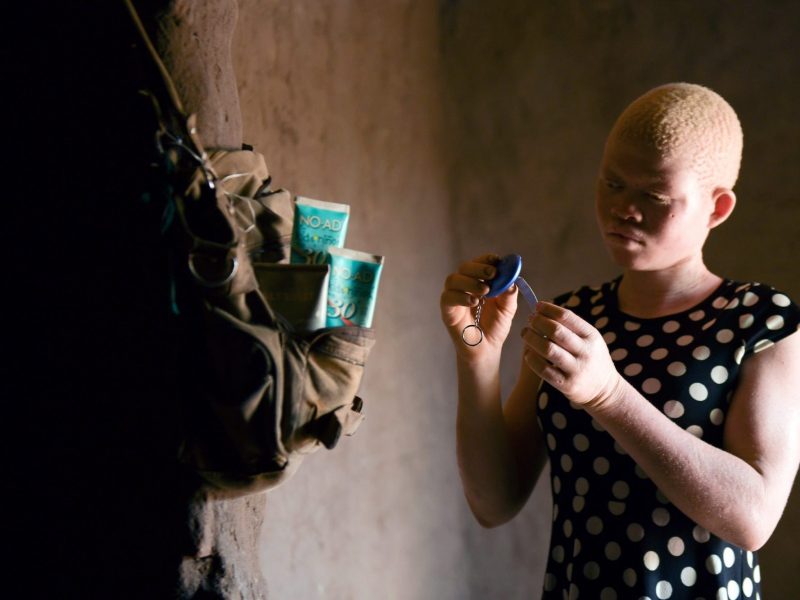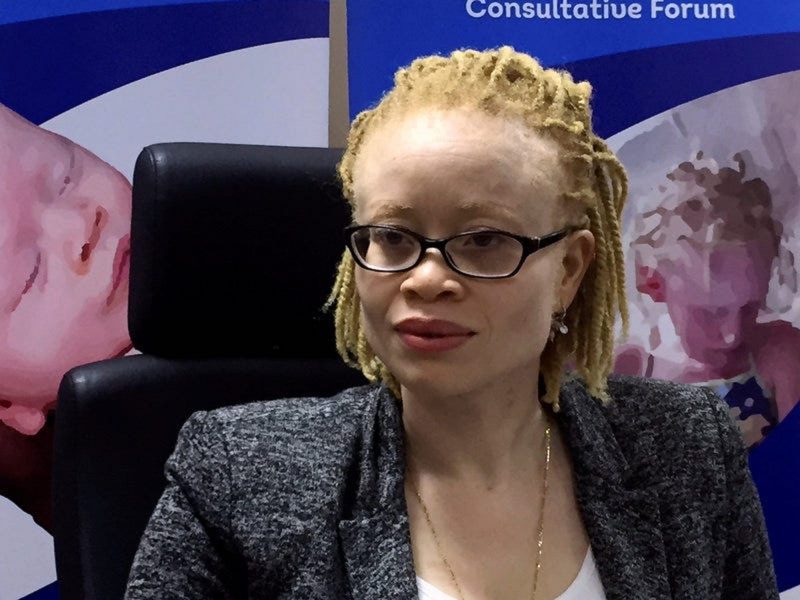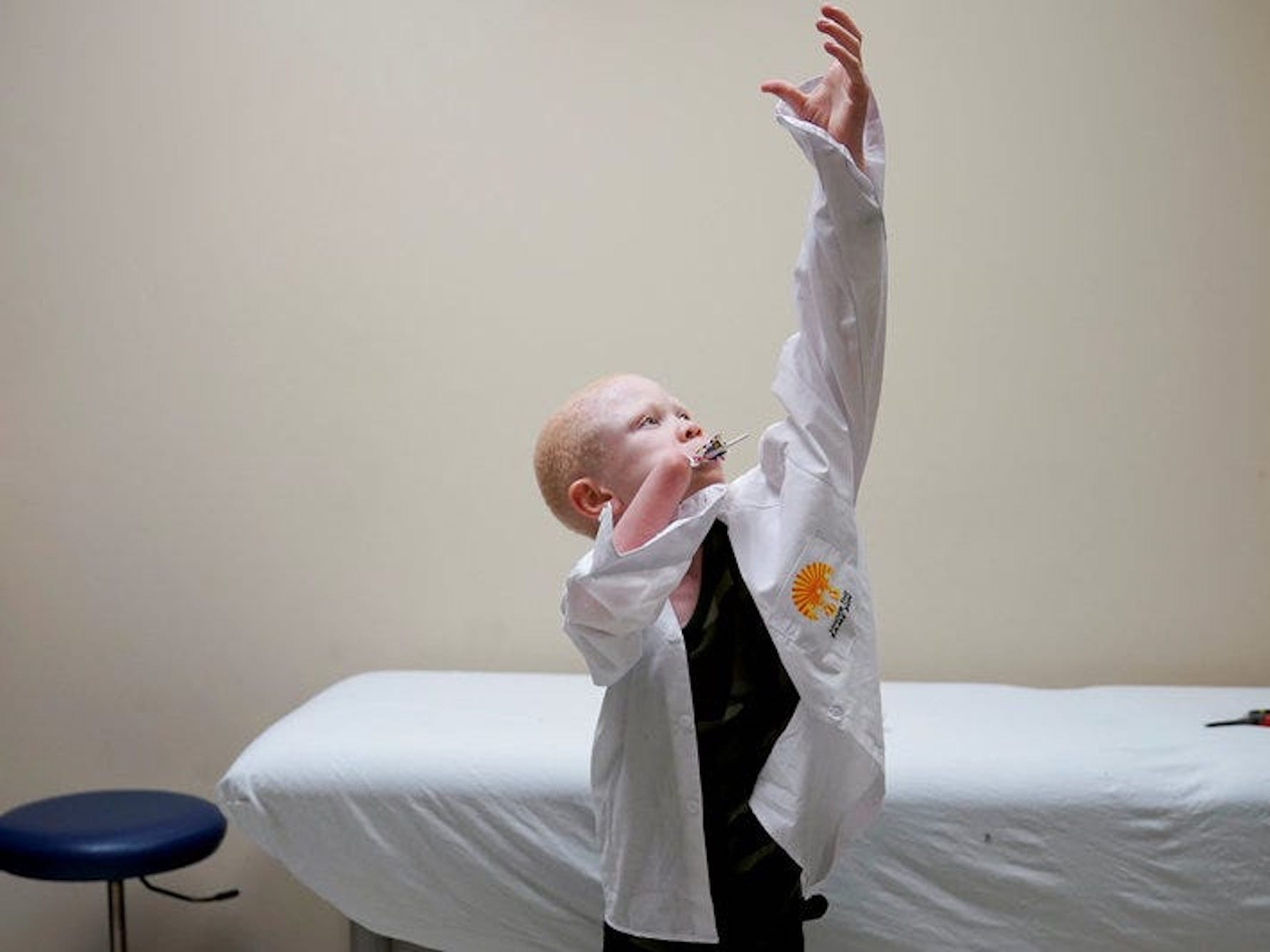- In many parts of Africa, people with albinism are misunderstood, mistreated, and even attacked or killed. Now they are also being blamed for the coronavirus pandemic.
- Traditional African belief systems have cast people with albinism as having magical properties and there is a lucrative trade in their body parts.
- The coronavirus has also become a significant health issue because of lockdowns. People with albinism cannot access vital medical support and supplies of suncream.
- International Albinism Awareness Day on June 13 aims to create a world where people with albinism can live a life free of stigma, discrimination, fear, and violence. The 2020 theme is “Made to Shine.”
- Visit Business Insider’s homepage for more stories.
People with albinism living in Africa are being blamed and persecuted for the coronavirus pandemic now hitting the continent, adding to the discrimination and stigma that already can blight their lives.
So far, Africa has been the continent least affected by COVID-19. But the World Health Organization (WHO) warned this week that the pandemic is accelerating.
It is more bad news for people with albinism, according to the United Nations that is hosting International Albinism Awareness Day on June 13.
“There are reports of persons with albinism being branded “corona” and “COVID-19″ in some countries, effectively labeling them scapegoats of the pandemic and further ostracising them in their communities,” said Michelle Bachelet, the UN High Commissioner for Human Rights, in a statement.
Kenyan TV has reported people with albinism having to go into hiding, and social media comments have confirmed that across Africa people with albinism are being targeted even more than in the past.
Dr. Charlotte Baker, Director of the UK-based Albinism in Africa Network, told Business Insider, that African belief systems explain people with albinism as carrying a contagious curse. COVID-19 is just another way of perpetuating this myth, she said.
"It is the perceived whiteness of people with albinism. It is being interpreted that they are carriers of what is seen as a white man's disease. It comes from China where people have fair skin in the African mindset and so they are seen as carriers of this disease. It's another dimension of the stigma attached to albinism," she said.
These beliefs can incite brutal attacks against people with albinism. A baby born with albinism may be considered a curse and be killed, according to Dr. Baker.
"In African black society to have a white child born into a community is so very visibly different and people are forced to try and explain that," she said.
"They may accept the genetic explanation but at the same time, it is a society that has many layers of other beliefs," Dr. Baker added.
Witchdoctors take advantage of the ignorance and superstitions, fuelling beliefs that people with albinism possess magical qualities or that the body parts of people with albinism used in charms and potions bring wealth, power, and good luck.
These beliefs fuels a grim trade in the hair, limbs, and entire bodies of people with albinism. The oft-quoted figure for the body of a person with albinism is $75,000.Customers for these body parts are often the leading figures in African societies, said Dr. Baker.
Election years are particularly unsafe for people with albinism, according to Under the Same Sun, an albinism advocacy group. There is an increased demand for body parts in the lead-up to elections when office-seekers are willing to pay thousands for the supposed supernatural boost to their political ambitions.
"They consult the witch doctor. The witch doctor says we need to you know the arm or the hair of a person with albinism," said Dr. Baker.
"Then there's another set of people involved in gathering those body parts and trading them. Often a person with albinism is identified, in the first instance, by a family member or a community member," she said.

The data on the number of people attacked for their body parts is unclear, said Dr. Baker. According to Under the Same Sun there have been more than 520 attacks on people with albinism in 28 African countries reported since 2006. But Dr. Baker said many more attacks are suspected that go unrecorded.
For example, the number of children reported to born with albinism is often less than the statistical average. This indicates that babies with albinism may have been killed at birth, said Dr. Baker.
Albinism is a hereditary condition that results in a lack of pigmentation in skin, hair, and eyes. While in Europe and North America approximately 1 in 20,000 people have albinism, the rates are much higher in Africa, with about 1 in 1,400 occurrences in Tanzania and as high as 1 in 1,000 reported for select populations in Zimbabwe.
In neighboring Malawi, for example, there are more than 134,000 people with albinism, representing 0.8% of the total population, according to the national statistics office in 2018.
For some people with albinism, life is a relentless struggle of the pariah, continuously bullied, persecuted, and marginalized.
And the coronavirus epidemic has only worsened their vulnerability.
Without sunscreen people with albinism face early death

Ikponwosa Ero, a UN independent expert on albinism, has warned of the COVID-19 threat. She said in a statement: "Other hardships for persons with albinism, many of whom are already amongst the poorest of the poor, include a severe lack of access to basic necessities such as food, sunscreen, and other life-saving devices. Persons with albinism and their family members, also lack access to accurate information about their condition vis-à-vis COVID-19."
Access to sunscreen is a life and death issue for people with albinism. It is skin cancer, not the body parts robbers that most threaten them, said Dr. Baker.
"Often it's overlooked but that's the biggest threat," said Ero, also not it is not uncommon for Africans with albinism to die early, many in their forties, because they've got skin cancer after years of skin damage that's been untreated.
'Made to Shine'
The UN International Albinism Awareness Day is on June 13, 2020, and its theme is "Made to Shine." Whilst recognizing the human rights struggles of people with albinism worldwide, the theme was chosen to celebrate the achievements and successes of the albinism community worldwide.
"It emphasizes that persons with albinism were made to stand out because they are outstanding in many ways as proven by the quality and quantity of their success stories in recent years," said Ero.
Dr. Baker is also hopeful that the stigma of albinism is gradually being challenged. Media coverage of the issue, NGOs and energized local groups campaigning for the rights of people with albinism and African governments more willing to grapple with albinism issues, are all causes for cautious optimism.
"These kinds of positive messages are really getting through now," she said.
